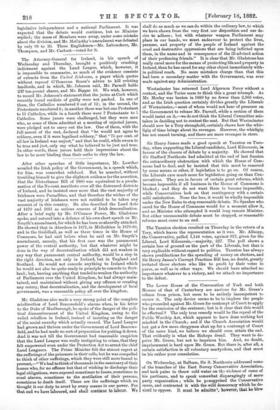After other speeches of little importance, Mr. Lowther assailed the
Irish policy of the Government, in a speech which, for him, was somewhat subdued. But he asserted, without troubling himself to give the slightest evidence for the assertion, that the Disturbance Bill of 1880 was equivalent to a procla- mation of the No-rent manifesto over all the distressed districts of Ireland, and he insisted once more that the vast majority of Irishmen were Parnellites, and that therefore the wishes of the vast majority of Irishmen were not entitled to be taken any account of in this country. He also described the Land Acts of 1870 and 1881 as serious sources of Irish demoralisation. After a brief reply by Mr. O'Connor Power, Mr. Gladstone spoke, and entered into a defence of his own short speech on Mr. Smyth's amendment, for which he has been so absurdly attacked. He showed that in Aberdeen in 1871, in Midlothian in 1879-80, and in the Guildhall, as well as three times in the House of Commons, he had said before what he said on Mr. Smyth's amendment, namely, that his first care was the paramount power of the central authority, but that whatever might be done in the way of decentralisation which did not weaken in any way that paramount central authority, would be a step in the right direction, not only in Ireland, but in England and Scotland. He would not concede anything to Ireland which he would not also be quite ready in principle to concede to Scot- land; but, barring anything that tended to weaken the authority of Parliament over the United Kingdom, he had always main- tained, and maintained without giving any offence or creating any outcry, that decentralisation, and the development of local government, was a reasonable policy all over the kingdom.


































 Previous page
Previous page